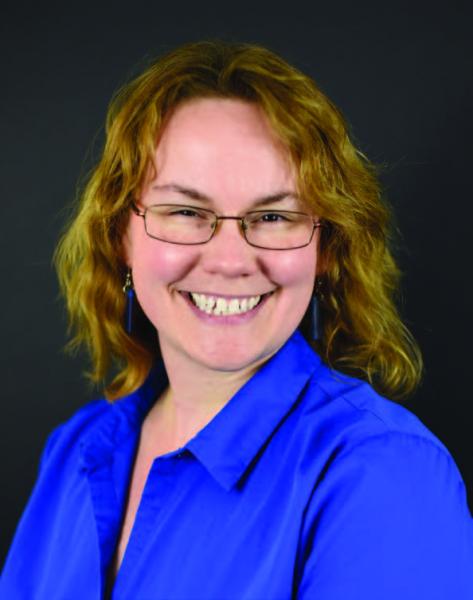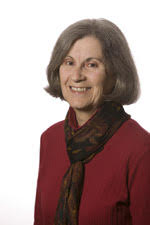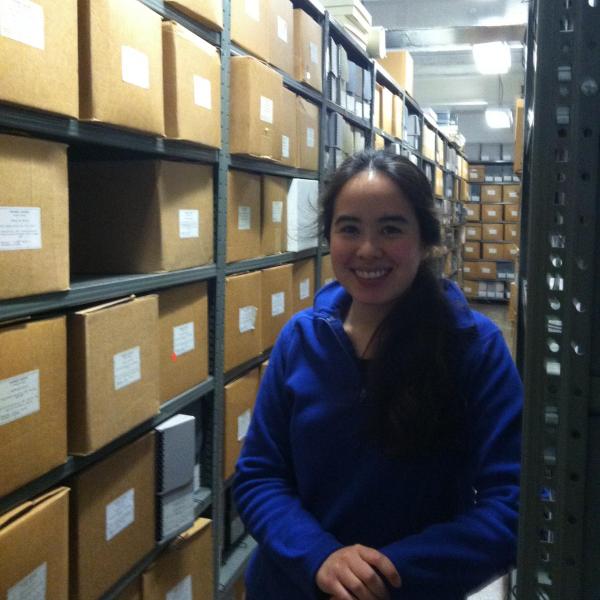- About Archives
- About SAA
- Careers
- Education
- Publications
- Advocacy
- Membership

Education:
Professional experience:
Selected professional activities:
Appraisal should be the first step in much of the work that goes into an archives—does this collection belong here? Does it belong elsewhere? What do we need to keep in this collection and what should be removed or discarded? Good appraisal decisions, with documentation to back them up, lessen the work at every other step along the way in a collection’s life in an archives, through processing and cataloging, retrieval and access, and potential reappraisal down the line. Too often appraisal decisions are not documented, however, or are not clearly thought out before a collection comes through an archives’ doors, physically or electronically. This section’s very purpose is to help everyone struggling with making appraisal decisions so that we don't reinvent the wheel, make decisions in a void, or feel like we’re facing these issues alone.
I would love to see what other work the Best Practices Subcommittee can do for the section—this is a great group of people invested in helping the rest of the profession, and I think they can continue providing support regarding the thorny issues involved in acquisitions and appraisal, stemming from the abandoned property project update and the ongoing work with providing tools for creating and making available collection development/acquisition policies. I’d also like to see the Third Thursday Twitter chats grow—I think it was a really smart decision to move the Third Thursday discussions from the blog to Twitter, and I think we can work to get more participation. As vice chair/chair elect and using the knowledge I've gained on the A&A Steering Committee the past two years, I would facilitate as and where I could, including continuing to reach out to other SAA sections and archives-affiliated groups for joint Twitter chats and support the work of the Best Practices Subcommittee.
Kira is currently an Archives Assistant at the United Church of Canada Archives in Toronto, Ontario where she has been working since completing her Master’s degree from the University of Toronto’s iSchool in 2015. While a graduate student, Kira worked at the University of Toronto Libraries Media Commons as part of the Toronto Academic Libraries Internship Program (TALint) as well as undertook a practicum at the Art Gallery of Ontario’s Library and Archives. She also participated in the Association of Canadian Archivists (ACA) U of T Student Chapter and acted as Vice-Chair in her second year. More recently, she is a new member to the Professional Development Committee of the provincial Archives Association of Ontario. This past year, Kira has been the Social Media Intern for the Acquisitions & Appraisal Section, sharing the activities of the Section through the A&A blog, Twitter and Facebook accounts. She also serves as the Key Contact for Western Canada for the SAA Membership Committee (2016-2019).
Appraisal is an integral component to archival practice as archivists determine record value and decision making around collections management that shape our documentary heritage. Applying subject knowledge, archival training, and critical thinking when making appraisal decisions compose a valuable skill set that can facilitate ongoing professional development. The Acquisitions and Appraisal Section (A&A) offers an important space to focus on issues and questions surrounding appraisal and acquisition methodology. The A&A Section also serves to engage with broader impacts of appraisal as well as the practical information sought after for collections management. Promoting best practices and keeping Section members up to date with current information related to acquisition and appraisal is a key facet of A&A. Past examples of Section projects such as the Abandoned Property Laws directory and forthcoming Collection Development Policy Survey demonstrate tangible, helpful resources that the A&A Steering Committee can provide. The A&A Section should work to create meaningful dialogue within the archival community, whether through online forums, formal reports, or at the Annual Meeting. To accomplish these tasks, A&A leadership can strategize project goals over the course of the term and incorporate member engagement and collaboration with other Section groups to generate new exchanges of professional learning.
Signing on as Social Media Intern has been a great introduction to the behind the scenes activities of Section leadership and working with the other Steering Committee members this past year has reinforced my motivation to stay involved with the A&A through an elected position. As Vice-Chair/Chair Elect, I would energetically work alongside the Chair and Steering Committee team to continue producing resources and professional discourse around appraisal and acquisition. My role would be to participate and help manage A&A projects, coordinate meetings, session planning for the Annual Meeting, as well as reach out to inform Section members on A&A activities.
Over the next two years, the ongoing work of the Best Practices Subcommittee aims to produce resources and guides as an important means of supporting the profession and creating useful reference tools. Outreach and a stronger online social media presence have been a primary focus of the Section and I see this as an area to continue the connection with members and solicit feedback on projects the membership would appreciate from A&A. Additionally, the use of our blog, under the direction of the Editorial Subcommittee, serves as an open space for others to invite others to contribute to and share experiences, collection challenges, and problem solving. Having been in charge in the bulk of the content posted through our social media outlets this last year, I am very familiar with our current practices and would like to spend time with the next Social Media Intern and other Steering Committee members on further developing our online outreach. Another worthwhile avenue to continue is that of collaboration with other Section groups. The topic of appraisal and acquisition inherently suggests an opportunity to connect with widespread archival interests - from outreach and donor relations, particular types of records and media, born-digital material, and to approaches carried out by different kinds of institutions. Partnering with other SAA Sections would help build upon committee efforts and shared interests and strengthen connections within the SAA community.

Patricia Galloway joined the University of Texas at Austin School of Information’s archival program, where she is now Professor, in 2000. She teaches courses in digital archives, archival appraisal, and historical museums. From 1979 to 2000 she worked at the Mississippi Department of Archives and History, where she was an editor, historian, museum exhibit developer, and manager of archival information systems, and from 1997 to 2000 directed an NHPRC-funded project to create an electronic records program for Mississippi. Her academic qualifications include a BA in French from Millsaps College (1966); MA (1968) and PhD (1973) in Comparative Literature and PhD in Anthropology (2004), all from University of North Carolina at Chapel Hill. She served on the Society of American Archivists Continuing Education and Professional Development committee 2005-2009 and has served on the Executive Board of the Society of Southwest Archivists. Her recent publications include a book of essays, Practicing Ethnohistory (2006), articles on “Intrinsic Value” and “Principle of Respect for Original Order” in the Encyclopedia of Archival Science (2015), and articles in American Archivist, Archivaria, D-Lib, Library Trends, Information and Culture, and IEEE Annals of the History of Computing.
Appraisal is important because without it archivists would have nothing to do; but that isn’t all by a long shot. Appraisal is especially important because we are in the process of crossing a line from paper to digital. As we emerge with many of our most serious secrets into the cloud and expose our very homes to data capture via the Internet of Things, we must seriously concentrate on privacy constraints in ways we have never had to be concerned about before. I think archivists are not ready for this (will the business archivist even ever see the personal data that has become literally stock in trade for her employer? Does anyone call in an archivist to check the genuineness of “fake news”?), but I think we can be—and we must be.
Following on from what I discussed above, I would like to see the Acquisitions and Appraisal Section partner with other sections concerned with community archives in order to discuss how we can value archival materials that may only be seen by a few people due to cultural preferences. Second, I could use my digital expertise to help the Section approach thinking through the kinds of privacy laws that exist especially in Europe and how they have and do affect appraisal. I have been working for some years on a project that concerns records from a hospital, and we feel that it is important to meet not only HIPAA standards but also those of the communities that cluster around such records.
Mary Anne Hamblen holds a Master’s Degree in History from Georgia State University, and a Master of Library and Information Science with a concentration in archives from the University of South Carolina. Her archival career began more than ten years ago processing an artist’s papers at the Georgia Museum of Art. Since then, her archival travels have taken her to the New York State Archives, and to Fairbanks, Alaska to direct the Senator Ted Stevens Papers project. She is currently Special Collections & Archives Librarian for the Rakow Research Library at The Corning Museum of Glass in upstate New York.
A member of SAA for many years, she previously served for two years on the Congressional Papers Section’s Steering Committee and Diversity Committee, as well as SAA’s Committee on Advocacy and Public Policy. She also belongs to the Mid-Atlantic Regional Archives Conference and the New York Archives Conference, for which she serves on the Nominating Committee. Whenever possible, she finds opportunities to share information and knowledge about archives and the profession, most recently presenting at the Carder Steuben Symposium and the Art Libraries Society of North America’s New York Chapter.
Archival appraisal can be a difficult and nuanced activity, requiring decisions that have a lasting impact on the historical record, as well as ensuring that collections are housed in an institution that can adequately process, preserve and provide accessibility. Collection acquisition and appraisal is not simply a one-time transaction, but rather a critical part of a process that includes ongoing conversations with donors, clear and well-defined institutional collecting policies, and procedures, workflows and documentation that provide good stewardship and discoverability.
The Acquisitions and Appraisal Section plays a vital role, both within the profession and beyond, in the information and resource sharing of current acquisitions and appraisal theories and strategies. This section takes the lead in providing guidance in this important aspect of the archival profession, and as a forum for discussion and exchange of ideas.
I would like to see the section continue to add and offer resources and guidance to archivists and institutions in developing solid policies, procedures and workflows for acquisition and appraisal activities through examples and case studies, social media platforms, and creative outreach. I believe a strategic plan could be developed to identify our top priorities, and create a timeline and procedures for attaining our major goals.
As an archivist, I am dedicated to advocacy and outreach, and would apply my experience to expanding our information-sharing to better reach those in the profession, as well as to seek other audiences. In my current position at the Rakow Library, I work with and advise several living donors, and in those instances appraisal often begins long before collections arrive. I would like to see archivists explore ways in which to engage with potential donors and their collections before the materials arrive at the repository.
As a Steering Committee member, I would work diligently to add to our impact and resources, and in making them easily attainable.

Dr. Lydia Tang joined Michigan State University’s Special Collections as a special collections archivist-librarian in 2015. Prior to coming to MSU, she was an archivist in the Music Division of the Library of Congress. She also previously worked at the American Library Association (ALA) Archives, and in a variety of positions at the University of Illinois at Urbana-Champaign, including the Rare Book and Manuscript Library, University Archives, Music and Performing Arts Library, and the Sousa Archives and Center for American Music. She received her MLIS degree with a Certificate in Archives and Special Collections from the University of Illinois at Urbana-Champaign, where she also completed a Doctor of Musical Arts degree with a cognate in Music Archives in 2016. She has been a member of the Society of American Archivists since 2013, presenting and chairing a panel in the 2016 annual meeting on Accessible Archives and Special Collections. She is also a member of the American Library Association’s Rare Book and Manuscript Section where she serves on the Diversity Committee.
Appraisal is the most important first step of a collecting institution and the ability to do it wisely and well sets up the institution for success or challenges throughout the rest of its operations, from backlogs, space concerns, and legal issues. Acquisition and Appraisal are some of the most difficult steps to teach archival students and can be a source of confusion when describing these issues beyond the archival world. The Acquisition and Appraisal Section is positioned to be the primary resource for archivists to build their professional knowledge, refine workflows, and exchange ideas as well as help our profession in defining and sharing the understanding of these tasks beyond our profession.
This section can be a resource for archives professionals and also, perhaps equally important, to non-archivists such as administrators who may not be aware of the processes and steps that archivists are trained to take. This section could help archivists explain to non-archivists what these common shared words mean in our profession. I would like to see the Acquisitions and Appraisal Section continue their outreach work, especially through the blog and twitter conversations. Through the blog, I’d like to see more scenarios and step-by-step strategies shared by more experienced archivists as well as expand the Valuable Inquiries postings. I also think A & A can contribute even more to the profession by providing guidelines for records management of archives and other collecting organizations, so new and non-archivists can understand what documentation needs to be retained for acquisitions. I really admire the work that has been done so far with A & A, and hope that potentially as a member of the Steering committee my drive and energy can build it even more, especially in its blog form by soliciting and contributing content, to be a resource for professionals at all stages and beyond the archival profession.